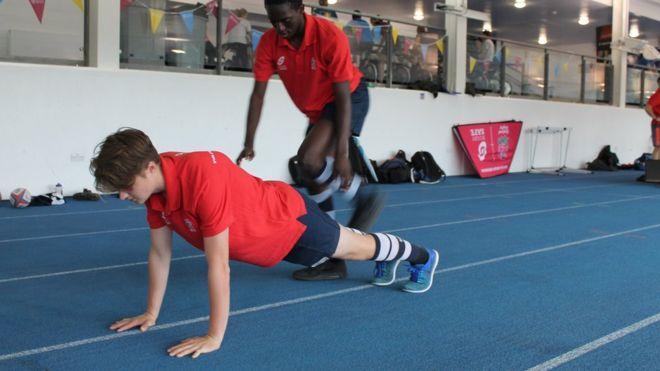In a study of 14- to 18-year-olds in 40 schools, those completing the exercises three times a week saw 59% fewer concussions than other schools.
The exercises focus on increasing neck muscle strength, balance and movement.
The RFU is rolling out the programme in schools in England from next season.
The Rugby Football Union says it will provide seminars for rugby coaches on the exercises, as well online resources and training pitch handouts.
Head and neck injuries are more common in rugby than other sports because of the impact of tackling and scrummaging.
During the teenage years, when boys and girls become stronger and fitter, the risk of injury increases sharply.
Prof Keith Stokes, who led the study, said the research showed that "a simple set of exercises on a regular basis can substantially reduce injuries in youth rugby".
He said: "We believe these findings will have a significant impact in helping to improve player welfare, making the game safer for young players to enjoy."
The exercise programme is split into four parts - and is made up of:
- a running warm-up with changes of direction (two minutes)
- single leg balance training (four minutes)
- targeted resistance exercises, including on head and neck (eight minutes)
- jumping, side-stepping and landing exercises (six minutes)
Some schools got their teams to complete the targeted exercises before matches and during training, while other schools were asked to continue with a standard exercise regime.
Only seven schools managed to complete their regimes three times a week, and those doing the new exercise programme saw 72% fewer match injuries and 81% fewer upper limb injuries than other schools.
Protecting the brain
The study found there were also fewer concussions, which made up most of the head and neck injuries reported.
In total, there were 441 match injuries, including 168 head or neck injuries and 125 upper limb injuries.
Prof Stokes said the neck exercises helped to strengthen muscles, allowing players to better cope with the forces acting on the brain inside the skull during contact.
"If people are moving better, they can also keep their head out of the way," he added.
Dr Mike England, medical director for community rugby at the RFU, who co-authored the study, said the exercise programme gave teenagers the skills to engage in physical activity safely.
"Injuries occur in any contact sport. We want kids to get involved and enjoy sport while reducing the risk of injuries at the same time."
He said he hoped that another study on exercises for adult rugby players would show similar effects.
http://www.bbc.co.uk/news/health-39950814


